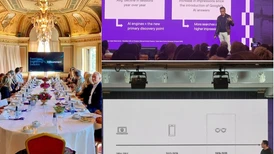Summary of Optimizely Roadshow in Stockholm
At Optimizely’s Stockholm roadshow, one thing stood out: AI is changing more than search and content — it’s transforming how brands build trust, relevance, and emotional connection. Find out what the key speakers had to say, as well as Linus' own reflections.

This week Optimizely held a roadshow at beautiful Grand Hotel in Stockholm. From private lunch sessions with a few Optimizely partners (as well as Epinova), to thought-provoking talks from renowned keynote speakers like Amer Mohammed and Optimizely President Shafqat Islam. One thing became clear: AI is so much more than just ChatGPT. It’s reshaping how we interact, build brands, and connect with people.
Emotional connection is the new differentiator
In a world where AI can summarize, recommend, and even generate content emotional connection becomes a brand’s most valuable asset. The companies that thrive are those that can build trust, empathy, and relevance - not just visibility. Amer recommended setting your strategies based on what people truly value:
- Time
- Health
- Money
These are the currencies of attention and loyalty. AI can help us optimize them, but it’s up to us to design experiences that respect and enhance them.
Amer also talked about how leadership groups and boards need to focus less on what’s happening right now, and to focus more on how the world is evolving and what is coming tomorrow. He gave a strong recommendation to follow what the Magnificent seven is doing (Apple, Microsoft, Amazon, Alphabet, Meta, Nvidia, and Tesla).
From traffic to AI visibility
Shafqat Islam from Optimizely shared insights of a powerful shift that is happening with the introduction of AI summaries and agents. This will affect how we evaluate digital performance. The old scorecard - Traffic, Engagements, SERP Rankings - is being replaced by metrics that are more relevant today and that reflect how AI systems perceive and surface our content:
- AI Visibility
- Crawl-to-Refer Ratio
- Impressions
This change is driven by how search itself is evolving. In July 2025, over 100 million users engaged with Google’s AI-powered search mode. Today, 42% of all Google queries include AI-generated overviews. And while fewer people click through to websites immediately, the quality of those clicks is rising – users now arrive with intent, ready to act. This is also what we are seeing when reviewing our client’s data. There are less page views but conversions have not changed due to this change in behavior – at least not so far.
The introduction of AI robots that crawl and present content directly in their interface, does not mean that SEO is dead – quite the opposite. AI agents still depend on web searches to find and collect up to date information. So having high SEO visibility will increase your changes of also being GEO visible. Search queries are also getting longer and more conversational. People are learning to describe what they are truly looking for, not just typing keywords. This opens up new opportunities for brands that can understand and respond to deeper user intent.
Getting ready for a world of A2A (agent to agent) interactions
Shafqat also showed a few very inspiring demoes together with Hristo Bakalov of what Optimizely Opal, Optimizely’s cross product spanning AI offering, can do already today with agents. Do you want to get a good understanding of how your site is doing? Just ask Opal which can directly interact with agents connected to data from web analytics tools like GA4, SEO tools like Semrush and other systems. It will quickly get data and draw conclusions based on data from these different systems.
Or perhaps you want to create the foundations for a campaign? Specialized agents will create the campaign brief as well as the content foundations which you can then review or optimize. And the content is not just created without any context (like with most AI agents). It’s based on your actual site content and assets as well as brand instructions making it much more spot on and usable than just using your generic AI agent like ChatGPT, Claude etc. And we're just seeing the beginning here. I expect a lot of productivity and quality improvements to happen where it's possible to automate a lot of boring but time consuming work.
And this is not happening in backend tools for productivity. Expect users to start doing actions like shopping directly from their agents. Perhaps even without visiting a website in a future that might not be that far away.
We’re in the midst of this AI revolution
At Epinova’s private lunch session, we discussed how AI is already being integrated into client projects today — from assistants that guide users to speed up editorial work to our Azure based AI framework that makes it easy to set up AI agent workflows in a secure environment. There's a lot of uncertainty at companies and organizations on how they can and should integrate AI into their business and raising everyone's understanding is important. Look at what others are doing today and get inspired to see how your business can evolve with these new opportunities that arises.
Some last thoughts
One thing that I’ve heard from many people in the industry during different events this year is how quickly things are moving right now. I’ve talked with several people with 20+ years in the IT industry and pretty much everyone agrees that change has never happened as fast as it’s doing right now. Shafqat described how they are doing weekly meetings in his team just to review what’s happened the last week and how it affects their ongoing work. Doing it every two weeks or even monthly simply isn’t enough right now.
Amer spoke about how he's spending on average 3 hours per day to read news, listen to podcasts and live events etc. just to keep of on what's happening (my personal goal is to spend at least 2 hours). If you are too bogged down in day to day work - try to find at least some time to keep up with what's happening. Perhaps you can get some time for this while travelling or training if you feel it's hard during main working hours. Though I recommend to set a company policy to try to include continuous learning as part of your work schedule.

We would like to hear what you think about the blog post